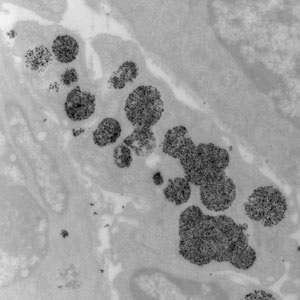 |
| Tumor cells take up magnetic nanoparticles (black)--Courtesy of Norris Cotton Cancer Center |
Dartmouth researcher Jack Hoopes has demonstrated that magnetic nanoparticle hyperthermia could be a possible treatment for breast cancer, as he presented in a new preclinical study at the American Association for Cancer Research annual meeting in San Diego.
According to Hoopes' presentation, the nanoparticles are injected into a tumor and activated with an MRI to produce heat inside cancer cells, killing them without producing side effects in other cells in the body.
"Although we initially used the (magnetic nanoparticle) therapy in an intra-tumoral delivery manner, and it has been effective, our goal and much of our current research is systemic (magnetic nanoparticle) administration aimed at invasive and metastatic cancer," Hoopes said in his presentation, according to an announcement from the Dartmouth-Hitchcock Norris Cotton Cancer Center.
The study showed enhanced uptake of magnetic nanoparticles when tagged with an antibody similar to Herceptin after intravenous injection in mice, according to the announcement. This increased uptake led to about 2.5 times more cancer-killing nanoparticles in the tumor, making it a promising combination treatment for women with breast cancer, and Hoope and his team are making plans for early-stage clinical studies, according to the report.
Along with the antibody treatment, Hoope also discussed biodistribution, nanoparticle heating characterization, mouse and canine efficacy studies and MRI imaging, among other aspects of the nanoparticles.
- here's the announcement